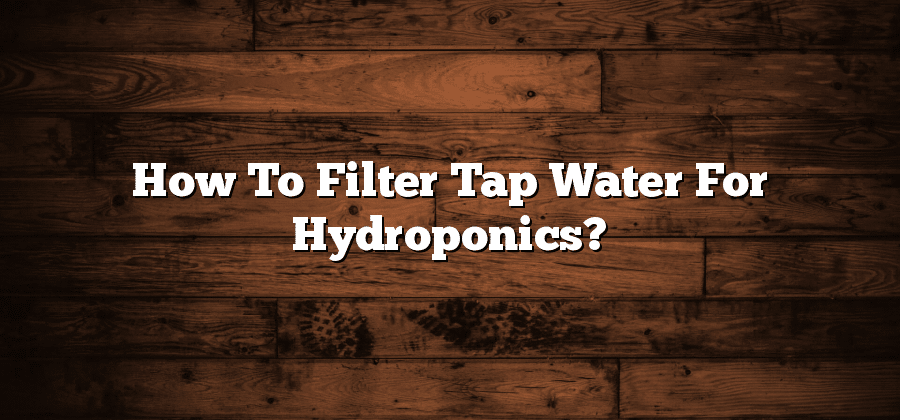Determining Water Quality for Hydroponics
The quality of water used in hydroponics is crucial for the success of the system. It is essential to determine the water quality before starting any hydroponic setup to ensure optimal growth and maximum nutrient absorption by the plants. Conducting a water quality analysis will help identify any potential contaminants or imbalances that could negatively affect the plants’ health and overall yield.
Several factors need to be considered when determining water quality for hydroponics. These include pH levels, electrical conductivity (EC), total dissolved solids (TDS), and the presence of harmful substances such as heavy metals, chlorine, or chloramine. A comprehensive water analysis conducted by a professional laboratory will provide accurate and detailed information about these parameters, allowing hydroponic growers to make informed decisions about water treatment and nutrient management.
Importance of Filtering Tap Water for Hydroponics
Proper water quality is crucial for the success of any hydroponic system. Tap water, despite being considered safe for drinking, often contains impurities that can negatively impact plant growth. Filtering tap water before using it in hydroponics can help remove these contaminants and ensure optimal nutrient uptake by the plants.
One of the main reasons for filtering tap water in hydroponics is the presence of chlorine and chloramine. Water treatment facilities commonly use these chemicals to disinfect tap water and kill harmful bacteria. However, chlorine and chloramine can also harm beneficial bacteria present in the hydroponic system, disrupting the natural balance and affecting plant growth. Filtering tap water effectively removes chlorine and chloramine, minimizing their negative effects on the hydroponic environment.
Understanding Water Contaminants in Tap Water
Tap water is readily available for hydroponic systems, but it is important to understand the potential contaminants it may contain. Municipal water sources often treat tap water with chemicals such as chlorine and chloramine to kill bacteria and other microorganisms. While these treatments are essential for ensuring safe drinking water, they can be detrimental to hydroponic plants. Chlorine and chloramine can harm the delicate balance of beneficial microorganisms in the hydroponic system, leading to poor plant growth and health.
In addition to chlorine and chloramine, tap water can also contain other contaminants such as heavy metals, pesticides, and pharmaceutical residues. These contaminants can potentially accumulate in the hydroponic system over time, affecting both the plants and the final harvested produce. Understanding the potential contaminants in tap water and their effects on hydroponic plants is vital in ensuring optimal plant growth and preventing contamination of the food or herbs being grown. Therefore, it is crucial to implement appropriate filtration systems to remove or reduce these contaminants and provide a clean and healthy water source for hydroponics.
Different Types of Water Filters for Hydroponics
When it comes to hydroponics, water quality is of utmost importance. Impurities and contaminants in the water can hinder plant growth and lead to poor harvests. One effective way to ensure that the water used in your hydroponic system is clean and free from harmful substances is by utilizing water filters. There are various types of water filters available that can cater to different needs and preferences in hydroponic setups.
One common type of water filter used in hydroponics is the carbon filter. Carbon filters are known for their ability to remove chlorine, sediment, and other organic compounds from tap water, providing a cleaner and healthier water source for your plants. Another popular option is reverse osmosis filters, which employ a semipermeable membrane to block impurities and contaminants, ensuring that only pure water passes through. These filters also help in maintaining a balanced pH level in the water, which is crucial for optimal plant growth.
Additionally, there are specialized filters like dechlorination filters that specifically target chlorine in tap water. Chlorine is commonly added to municipal water supplies as a disinfectant, but it can have negative effects on hydroponic systems. Dechlorination filters effectively remove chlorine, safeguarding your plants from any potential harm. Overall, selecting the right water filter for your hydroponics setup is essential for maintaining water quality and ultimately maximizing the growth and yield of your plants.
Choosing the Right Water Filter for Hydroponics
Hydroponics is a method of growing plants without soil, where the roots are immersed in a nutrient-rich water solution. The quality of the water used in hydroponics is crucial for the overall health and productivity of the plants. Since tap water may contain various contaminants, it is necessary to filter it before using it in hydroponics systems. However, with numerous types of water filters available on the market, it can be challenging to choose the right one for your specific needs.
When selecting a water filter for hydroponics, it is important to consider the type of contaminants you need to remove. Different filters are designed to target specific impurities, such as chlorine, heavy metals, pesticides, and bacteria. Conducting a water analysis can help identify the specific contaminants present in your tap water, which can then guide you in selecting the appropriate filter. Additionally, some filters combine multiple filtration methods, providing a comprehensive solution for water purification. It is crucial to assess the efficiency and effectiveness of the filter in removing the targeted contaminants to ensure optimal water quality for your hydroponics system.






